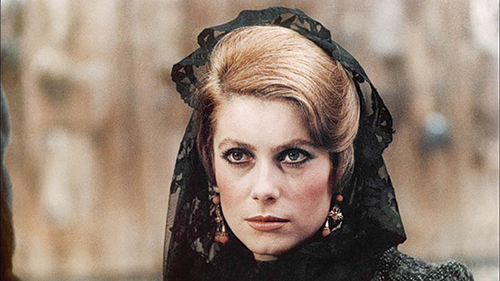
“In order to keep a woman honorable, you must break her leg and keep her at home,” says Fernando Rey’s dastardly pervert, Don Lope, early on in Luis Bunuel’s 1970 film, Tristana.
This statement becomes ironic for him in Bunuel’s tale of 1920s Spain, where a helpless and beautiful girl takes revenge on the rich and powerful man who corrupts her. Tristana screens this weekend at the Northwest Film Center in downtown Portland.
Catherine Deneuve stars as the title character, an orphaned girl of 19 who becomes the ward of Don Lope, an atheist intellectual in the Spanish city of Toledo.
These days, it’s hard to imagine a 19-year-old being adopted, but I suppose her alternative prospects would have been fairly grim, something Don Lope creepily reminds her of later on.
Tristana was released three years after Belle de Jour, and 26-year-old Deneuve was at the height of her fame, so Bunuel’s French investors insisted that he cast her.
Her incredible beauty lends itself to the overall look of the film, but it’s a little hard to imagine her as a wide-eyed innocent. Of course, Deneuve’s Tristana doesn’t remain innocent for long.
Don Lope is both a surrogate father and a strange kind of master to Tristana, and he makes it clear from the beginning that he doesn’t like her leaving the house. It’s soon obvious that he is looking for a wife, not a daughter, and she becomes essentially his sexual property.
Tristana’s only companions are Don Lope’s housekeeper, Saturna (Lola Gaos) and Saturna’s mute son, Saturno (Jesus Fernandez). Eventually, Tristana begins to resist his power over her freedom and meets and falls in love with artist Horacio (the dashing Franco Nero).
When Horacio learns of her situation, he manages to get Tristana to leave the city with him. She returns to Don Lope two years later with a tumor that results in the amputation of her leg.
That’s when the power in their relationship shifts. Tristana might return from her proverbial sea change physically crippled, but her mental and emotional strength compounds until at one point she is even referred to as “diabolic.”
Deneuve’s performance vastly improves as she watches her former captor grow weaker. Has she become a monster? Has she become what Don Lope made her?
Instead of being the melodrama Tristana could have been, the story is grotesque, surreal and strangely triumphant.
Bunuel first had the idea of adapting Benito Perez Galdos’ novel Tristana in 1962, but difficulties with the script and the Spanish censors sidetracked the project for a number of years.
It was an international production, with Deneuve and Franco’s voices dubbed into Spanish. French and English dubbed versions were also released, finally, in 1970; the film was nominated for the Best Foreign Language Film Academy Award.
Tristana is not a particularly hopeful film, but neither is it particularly morose. It’s a complicated study of two people who thrive on each other’s weaknesses, presented in a version of Bunuel’s classic style.
Tristana’s recurring dream of Don Lope’s severed head swinging from a church bell evokes a representation of the grotesque inner life boiling beneath Deneuve’s exquisite face.
The character of Saturno, whose role is increased in the film version, serves as a sort of mirror for Tristana even as she repels and teases him. It’s the kind of film you could spend a long time analyzing. Roger Ebert said it was born of Bunuel’s great obsessions with sadomasochism and demolishing religious morality.
Indeed, Tristana does have a warped but deeply-felt affection for Don Lope, who transitions from her victimizer to her victim. The power play in the relationship is the central focus, even if it’s sometimes unclear what Bunuel is really trying to say.
Ultimately, while you can tell Tristana was made with little money, and while the film could actually benefit from being stretched beyond its 98-minute running time, it really works. It’s a compelling film, not only for the complicated Freudian psychology behind it but also for the uniqueness of the narrative.
Tristana
Whitsell Auditorium
1219 SW Park Ave.
Saturday, May 18, 7 and 9 p.m.
Sunday, May 19, 7 p.m.
$9 general, $8 students
Tristana and Don Lope are both fully realized characters and Deneuve, while seeming slightly miscast, gives Tristana a mysterious allure that resonates through the entire movie.
The Northwest Film Center is screening the newly restored version of what is often called the quintessential Bunuel film: It’s profound, cynical and yet eminently watchable at the same time.
Tristana remains a testament to the famous director’s ability to create an intricate world and then let the rest of us live in it.

